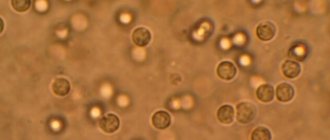Norm of leukocytes in urine in pregnant women
Normally, there are no leukocyte cells in the urine or only two or three in the field of view. For women, a maximum of five in sight is allowed.
Normal: leukocytes in urine during pregnancy do not differ from standard indicators (up to five in the field of view). The norm for the 3rd trimester is also similar.
When conducting a urine test according to Nechiporenko, up to 2000 leukocytes are allowed in 1 ml of urine sediment (after centrifugation).
An increased content of leukocytes in the urine is called leukocyturia. She may be:
- mild or insignificant (less than forty leukocyte cells in the field of view);
- moderately expressed (from fifty to one hundred leukocytes);
- expressed.
When the content of leukocytes increases to more than two hundred in the field of view, a diagnosis of pyuria is made. When pyuria develops, pus is released in the urine. This type of urine has a putrid, pungent odor and a cloudy yellowish-green color.
What to do if a large number of leukocytes are found in the urine
Having learned about this result of the analysis, you should not immediately panic and get upset.
The first thing you need to do is ask the doctor to give a second referral for a urine test and thoroughly prepare for it so that the result is as reliable as possible. To do this you need:
- Prepare a jar for analysis. It needs to be washed thoroughly, and then pour boiling water over not only the container itself, but also the lid. You can buy a special urine container at the pharmacy.
- The sterilized container must be dried by placing it upside down on a clean paper or cloth napkin. Therefore, the container should be prepared in the evening. Pharmacy containers are usually sold sterile and individually packaged and do not require prior preparation.
- Only morning urine should be collected for analysis, without using any other containers for collection. You need to urinate immediately into a prepared container.
- Before collecting urine, wash thoroughly with soap or your usual hygiene product, then wipe the skin dry with a clean towel.
If the test is repeated due to the fact that during the first study large quantities of leukocytes were found in the urine, it is recommended that before washing, close the entrance to the vagina by inserting a sterile tampon into it to avoid particles of vaginal discharge getting into the collected urine.
A urine test for pregnant women is usually prescribed once a month, but if any problems or deviations from the norm arise, the frequency of the test may be increased.
Elevated leukocytes in urine during pregnancy
It should be noted that a diagnosis cannot be made based on a single urine test. If there are a lot of leukocytes in the urine, the analysis must be repeated with a more thorough toilet of the external genitalia, to exclude false results.
If elevated leukocytes are repeatedly detected, women are recommended to be examined by a gynecologist in order to exclude inflammatory processes such as vulvovaginitis and bacterial vaginitis.
A general blood test and ultrasound examination of the pelvic organs and kidneys are also performed.
Urine analysis should be supplemented by culture for sterility (detection of bacteriuria).
Spectrum of microorganisms that cause UTIs
In most cases, inflammation of the bladder, kidneys, urethra, etc. is associated with Escherichia coli, Proteus, Klebsiella. Less commonly, UTIs are caused by staphylococci, enterobacter, and streptococci.
In sexually transmitted infections, the most important role is played by gonococci, trichomonas and chlamydia.
Leukocytes in urine are increased during pregnancy: reasons
A lot of leukocytes in the urine during pregnancy may indicate the presence of:
- stones in the ureters;
- pyelonephritis;
- pyelitis;
- cystitis;
- urethritis;
- asymptomatic leukocyturia and bacteriuria in pregnant women;
- glomerulonephritis (combined with hematuria and/or proteinuria);
- capillary glomerulosclerosis;
- disseminated lupus erythematosus;
- urinary allergosis (extremely rare);
- malignant arterial hypertension;
- kidney tuberculosis;
- toxicosis (increased leukocytes in the urine during late pregnancy, combined with proteinuria, are especially dangerous);
- sexually transmitted diseases;
- gynecological inflammations (bartholinitis, vaginitis and vulvovaginitis, adnexitis, etc.).
It should be noted that with a pronounced alkaline reaction of urine, leukocytes are destroyed, therefore, an increase in leukocytes in a urine test may be absent even in the presence of severe inflammation. In this regard, when conducting the study, be sure to pay attention to the pH of the urine.
Pyuria in pregnant women can be caused by:
- pyelonephritis and pyelitis;
- gynecological inflammatory processes;
- carbuncle or kidney abscess in the breakthrough stage (when pus is excreted in the urine);
- breakthrough of purulent inflammatory processes from OMT (pelvic organs) into the urinary tract;
- chronic inflammation of the bladder;
- bladder cancer;
- renal vein thrombosis (in rare cases, increased leukocytes in the urine during late pregnancy may be due to renal vein thrombosis due to hypercoagulation);
- toxic shock;
- severe toxicosis (possible sterile pyuria).
Read further: Causes of elevated leukocytes in urine in women and men, table of norms, prevention
The role of leukocytes and why they increase
Let's start with a general definition. Leukocytes mean white blood cells, whose main task is to protect our body from disease. Consequently, an increase in the content of these cells becomes direct evidence that the body is actively fighting a disease. During pregnancy, especially in the early stages, even a harmless cold can have serious consequences for the fetus, so it is very important to detect the source of inflammation in time and begin treatment.
During pregnancy, the leukocyte rate increases slightly, which is directly related to the suppression of the woman’s immune system.
The bone marrow is responsible for the production of these substances. During the inflammatory process in the body, leukocytes easily pass through the walls of blood vessels and can enter the urine. There may be several reasons for the increase:
- Pyelonephritis. A very dangerous disease that occurs very often during pregnancy due to physiological changes in a woman’s body. It is a bacterial infection of the renal pelvis.
- Cystitis. Inflammatory processes that are localized on the mucous membrane of the bladder.
- Glomerulonephritis. Another disease that is a frequent companion to pregnancy. The most obvious symptom can be considered urinary retention and, as a result, severe intoxication of the whole body.
- Development of urolithiasis. The disease is also accompanied by rare urination and requires immediate help.
- Sexual infections. They are the ones who in most cases cause an increase in leukocytes in the urine. Any process poses a serious threat to the life of the fetus, so the woman requires immediate help from specialists.
Before the test, you should definitely consult a doctor about the medications you are taking. In some cases, they are the ones who can distort the results. Therefore, the specialist will consider the option of temporarily discontinuing the drugs to obtain an objective analysis.
What symptoms accompany an increase in leukocytes in the urine?
Leukocyturia in urine tests means the presence of inflammatory processes in the bladder (genitourinary system). In most cases, the cause of an increase in white blood cells during pregnancy is:
- acute or chronic cystitis;
- pyelonephritis;
- asymptomatic bacteriuria.
Inflammation of the bladder (cystitis)
The disease is manifested by discomfort and pain in the lower abdomen (maximum pain is observed above the pubis), frequent false urge to urinate, burning and stinging during urination. In severe cases of the inflammatory process, fever, chills, and streaks of blood may appear in the urine.
Pyelonephritis
Pyelonephritis is an inflammatory process that affects the kidneys. In this case, inflammation affects the interstitium, tubules and pyelocaliceal system.
Symptoms of the disease, as a rule, develop acutely, with fever, chills, tachycardia, and pale skin. Patients complain of lower back pain (more intense on the affected side), muscle and joint pain, nausea (possible vomiting, which does not bring relief).
There may also be an increased urge to urinate, pain, and discomfort when urinating. Urine is cloudy with an unpleasant odor. Visible mucus and streaks of blood may appear.
In the absence of timely treatment, pyelonephritis during pregnancy is accompanied by a high risk of developing urosepsis, intrauterine fetal death or premature birth.
Asymptomatic bacteriuria in pregnant women
This term refers to persistent bacterial colonization of the urinary tract of a pregnant woman, without clinical symptoms of the inflammatory process.
It should be noted that despite the absence of clinical manifestations, such bacteriuria is not a harmless condition that does not require treatment, since it significantly increases the risk of developing cystitis and pyelonephritis.
In addition, urinary tract infections during pregnancy can cause IUGR (intrauterine growth retardation), premature birth of a baby (prematurity), the formation of congenital anomalies (with infections in early pregnancy), and also lead to intrauterine infection of the fetus, intrauterine death and spontaneous abortion, infection during childbirth, and the development of postpartum sepsis.
Urethritis during pregnancy
The occurrence of an inflammatory process in the urethra is accompanied by the appearance of burning and pain during urination, frequent false urge to urinate, difficulty urinating (due to swelling). There may also be discharge of pus, mucus and streaks of blood.
If symptoms of urethritis are detected, you should be tested for STDs (sexually transmitted diseases), since the main cause of urethritis is gonococci, Trichomonas chlamydia.
Vulvitis and vaginitis
The main symptoms are discomfort, burning and dryness in the vagina. Muco-purulent or muco-bloody discharge with an unpleasant odor from the vagina may appear. There may also be nagging and aching pain in the lower abdomen and lower back.
Adnexit
The inflammatory process in the ovaries is accompanied by increased temperature, fever, chills, nausea, bloating, severe pain in the lower abdomen (sometimes the pain radiates to the lower back or leg), the appearance of mucopurulent or purulent discharge from the vagina, pain when urinating. On palpation, the uterine appendages are sharply painful.
Bartholinitis
The inflammatory process in the glands of the vaginal vestibule is accompanied by severe pain, aggravated by walking or sitting, an increase in the size of the gland and swelling of the labia majora on the affected side. There is also severe dryness and burning in the vagina, discomfort when urinating.
When a Bartholin gland abscess ruptures, pus is discharged. At the stage of abscess formation, there is an increase in body temperature and intense throbbing pain in the labia majora.
Late toxicosis (gestosis) of pregnancy
One of the most dangerous complications of late pregnancy is preeclampsia and eclampsia. With the development of these conditions, urine tests will show not only sterile leukocyturia, but also significant proteinuria.
Clinical symptoms of late gestosis are:
- increased blood pressure;
- the appearance of edema;
- persistent and severe headaches;
- visual impairment;
- nausea and vomiting;
- loss of consciousness;
- flashing of flies and colored spots before the eyes;
- tremor of the limbs;
- convulsions.
If these symptoms are detected and preeclampsia is suspected, the pregnant woman is immediately hospitalized. The development of eclampsia can cause disseminated intravascular coagulation, bleeding, placental abruption, death of the fetus and the pregnant woman.
Urolithiasis disease
In some cases, an increase in leukocyte and erythrocyte cells in a urine test may indicate urolithiasis. Its symptoms may include lower back pain and severe discomfort when urinating (in the presence of sand).
Vivid clinical symptoms are characteristic of the development of renal colic. In this case, sharp, intense and excruciating pain occurs in the lower back, abdomen, along the ureter, etc. The pain may radiate to the leg. Patients are extremely restless, screaming, rushing about in pain. Fountain vomiting is possible.
What to do if elevated white blood cells are detected in a urine test?
The main criterion for diagnosing a urinary tract infection is the combination of leukocyturia with bacteriuria. Also, the presence of clinical symptoms will indicate in favor of the inflammatory process:
- lower back pain;
- dysuric disorders;
- increase in temperature, etc.
A blood test may show accelerated ESR, leukocytosis and neutrophilia. An increase in acute phase proteins (C-reactive protein) is also characteristic. However, such changes are characteristic of severe inflammation (pyelonephritis) with uncomplicated cystitis or urethritis; there may be no changes in the blood test.
Read further: Leukocyte blood count - decoding in adults and children, normal
In the presence of minor and periodic leukocyturia, it cannot always be detected using a routine urine test. To obtain more reliable results, special quantitative analyzes are performed (Addis-Kakovsky and Amburger tests).
To exclude gynecological inflammation, vaginal smears are taken for further microscopy.
Additionally, it may be recommended to submit urine for a urocytogram (indicated in the presence of a burdened allergic history, to exclude urinary allergies).
It is mandatory to undergo examination by a gynecologist, examination for STIs, and also perform an ultrasound examination of the pelvic organs and kidneys.
Elevated leukocytes in urine during pregnancy: algorithm of actions











